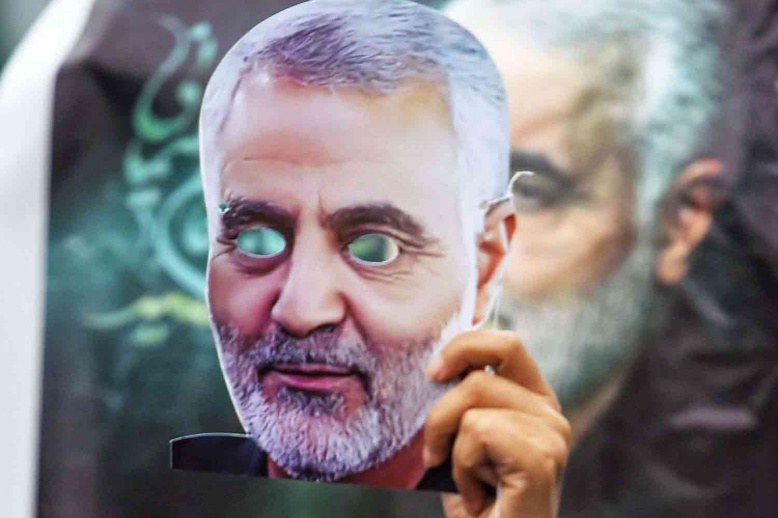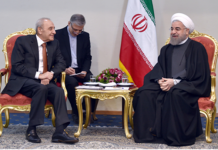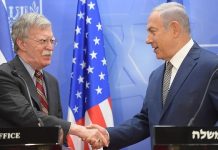Analysis/Iran Retaliated. Now May Come the Covert Proxy Revenge
Amos Harel/Haaretz/January 10/2020
عاموس هاريل/هآرتس: انتقمت إيران لإغتيال سليماني ولكن قد تأتي لاحقاً ردود مقنعة لأذرعتها
Qassem Soleimani wasn’t the only high-profile target assassinated by the U.S.
The Iranian response to the U.S. assassination of top Iranian general Qassem Soleimani was delivered Tuesday overnight in an expected location – Iraq – but with rather limited intensity. The dozen missiles fired at joint American and Iraqi military bases caused relatively little damage.
President Donald Trump, speaking at the White House on Wednesday, insisted there were no casualties, but this didn’t stop Tehran, through its media outlets, from claiming dozens of American troops were killed.
There are some similarities between these latest developments and the spike in tensions between Israel and Lebanon-based Hezbollah in September.
With Iran’s encouragement, Hezbollah retaliated to a series of attacks against Iran-backed Shi’ite groups in the region attributed to the Israeli army, while Israel claimed responsibility for only one of them.
Tensions between Hezbollah and Israel soared as the organization’s leader, Hassan Nasrallah, and other top figures threatened harsh responses for the attacks, and eventually came to a head when anti-tank missiles were fired at an Israeli military ambulance on the border with Lebanon.
The incident, which came after a week of growing hostilities, caused some damage but no casualties.
Nonetheless, Hezbollah claimed (in part on the basis of a diversionary maneuver carried out by the Israel Defense Forces) that Israeli troops were killed in the incident.
In any event, it was abundantly clear that Nasrallah wanted to find a way to end that round of violence instead of intensifying it, even if Hezbollah didn’t succeed in killing Israelis.
This week, Iranian officials declared they would avenge Soleimani’s death, and even marked their target – American forces deployed in Iraq. Their partners, including Nasrallah, talked about the need to expel the 5,000 American troops from Iraq and to completely eliminate the U.S. military presence in the region.
The fact that the recent series of events between the U.S. and Iran, which culminated in Soleimani’s assassination on January 3, took place in Iraq was surely another consideration behind Iran’s choice of Iraq as the setting for its retaliation.
It occasionally bears repeating that the Iranian leadership is radical in its faith and stances, but it is not irrational.
The balance of power between Iran and the United States is clear and the Iranians are certainly not interested in a direct military confrontation at the moment.
Thus, Western intelligence agencies, and Trump, according to his Wednesday statement, are under the general impression that the immediate Iranian response to Soleimani’s death will be confined to the missile strike.
In his statement, Iran’s Foreign Minister Mohammad Javad Zarif implied that Iran “took proportionate self-defense measures” after it was attacked and is not seeking further escalation.
However, this assessment does not rule out the possibility of further attacks at a later stage, perhaps carried out covertly and without officially assuming responsibility. Iran and Hezbollah have done this is the past, when they set in motion plans to avenge the death of Hezbollah’s first secretary general, Abbas al-Musawi, and the assassinations of Hezbollah senior leader Imad Mughniyeh and Iranian nuclear scientists in 2008, all of which were attributed to Israel, with American involvement in the case of Mughniyeh.
Weeks, or even months, could go by between the operations and the Iranian retaliation.
It seems that in the long-run the Iranians will continue working to achieve the strategic goal they set for themselves – the removal of U.S. troops from Iraq.
Iran’s Supreme Leader Ayatollah Ali Khamenei also declared Wednesday morning that Tehran’s main objective was to force American forces to withdraw from the entire region.
When asked about the issue on Tuesday, Trump was evasive, reiterating his claim that he would demand compensation from Iraq for the presence of the American military on its soil.
However, his reluctance to remain in the country is evident, and in the coming months the Iranians will likely step up pressure to make U.S. forces pull out of Iraq.
“Eventually we want to be able to allow Iraq to run its own affairs. This isn’t the right point,” Trump said.
The president apparently does not understand why U.S. troops should stay in Iraq, despite the pressure exerted by Saudi Arabia, Jordan, Israel and other countries concerned about the ramifications of a possible American retreat.
The Iranians are having a tough week – Soleimani’s assassination, a deadly stampede during the top general’s funeral, the crash of an Ukrainian airplane (with many Iranian nationals on board) shortly after takeoff from Tehran, and even, to top it all off, an earthquake, which struck the country on Wednesday morning.
There is no doubt that Trump surprised Tehran by taking out Soleimani. He may well have thrown the Iranian leadership off-balance.
But it is premature to conclude that the assassination, and Iran’s lax response, are tantamount to defeat, showing Iran’s vulnerability to an attack aimed at its nuclear sites.
It’s far too early to eulogize the Iranians, who could still cause major regional damage if they so desire.






















